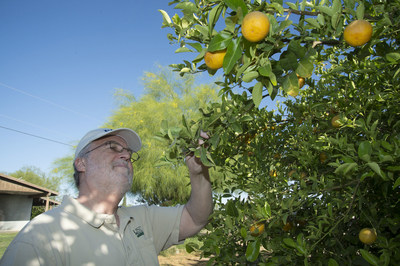WASHINGTON, June 13, 2022 /PRNewswire-HISPANIC PR WIRE/ — The U.S. Department of Agriculture’s Animal and Plant Health Inspection Service (APHIS) needs your help safeguarding Texas citrus from invasive citrus pests and diseases currently threatening livelihoods and agricultural production in the Lower Rio Grande Valley.

APHIS employees in Cameron, Hidalgo, Willacy and Zapata counties are working with the Texas Department of Agriculture (TDA) to inspect and survey fruit trees in residential yards and commercial properties for signs of invasive fruit flies and citrus diseases, such as citrus canker and citrus greening, These pests and diseases, if allowed to become established or spread, could devastate grapefruit, sweet and sour orange, key lime, sweet lemon, and other types of fruit production in that area.
The invasive fruit fly (Anastrepha ludens) is native to Mexico and Central America, and while harmless to humans and animals, it attacks more than 40 different kinds of fruits and vegetables. The pest poses a threat to homegrown fruit, as well as the commercial grapefruit and orange industry, which in 2021, accounted for more than $67 million in statewide revenue, according to USDA’s National Agricultural Statistics Service.
USDA and TDA have established parallel fruit fly quarantine areas where invasive pests have been detected and are asking residents and business owners to help limit the spread of citrus pests and diseases by cooperating with survey teams and allowing them to access your property to inspect fruit trees and hang traps. If fruit flies are detected, they may also ask your permission to conduct treatments. USDA and State surveyors will all have official USDA or TDA credentials and will follow all Centers for Disease Control and Prevention health guidelines, including maintaining appropriate social distance.
We need your help to protect Texas citrus and keep this pest off your residential fruit trees. Fruit flies are drawn to ripening fruit. Here are some protection tips:
- Remove all mature citrus fruit and any other host material, including fruit that has fallen to the ground, from your property as soon as possible.
- Eat the fruit or double bag it and put it in the trash.
- Don’t compost fruit or vegetables from the quarantined areas.
- If you live in a citrus disease quarantine area, dispose of tree trimmings in plastic bags. Double bag the branches and other debris and dispose of them with your household waste.
- Don’t move or mail homegrown fruit or plants to destinations outside of the quarantined areas.
- Declare agricultural products—including fruit—to U.S. Customs and Border Protection before entering the United States from another country.
- Be cautious purchasing fruit from social media or backyard vendors.
To view the citrus disease quarantine areas, visit APHIS’ Interactive Citrus Federal Quarantine Map.
If you have any questions about our surveys or a citrus health concern, please contact your local APHIS office at:
- For Cameron and Willacy Counties, call (956) 421-4041;
- For Hidalgo County, call (956) 632-5300; and
- For Zapata County, call (956) 726-2225.
For more information on the invasive fruit fly and other damaging insects or plant diseases, visit HungryPests.com and the APHIS Citrus Diseases webpage.
USDA touches the lives of all Americans each day in so many positive ways. In the Biden-Harris Administration, USDA is transforming America’s food system with a greater focus on more resilient local and regional food production, fairer markets for all producers, ensuring access to safe, healthy and nutritious food in all communities, building new markets and streams of income for farmers and producers using climate smart food and forestry practices, making historic investments in infrastructure and clean energy capabilities in rural America, and committing to equity across the Department by removing systemic barriers and building a workforce more representative of America. To learn more, visit www.usda.gov
Media Contact: Yelena Grillet
(786) 247-7194
[email protected]
Photo – https://mma.prnewswire.com/media/1837593/USDA_Citrus.jpg
SOURCE USDA – APHIS






